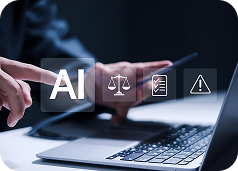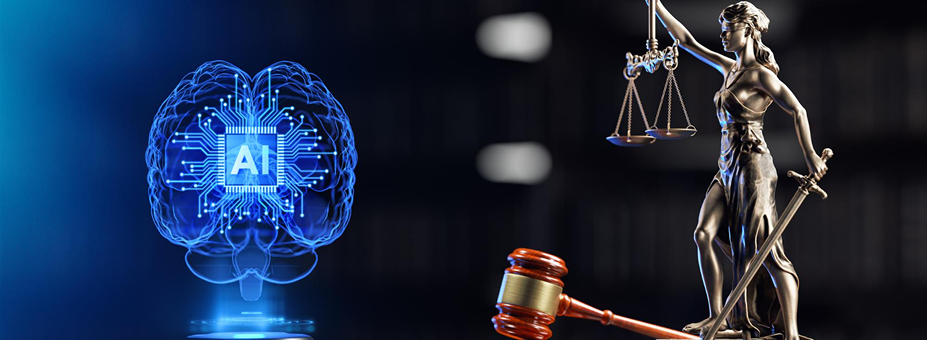The legal industry is rapidly evolving, and AI in Corporate Law is at the forefront of this transformation. By harnessing the power of AI technologies, law firms are fundamentally reimagining processes, reducing operational costs, and enhancing service delivery. As we look towards 2025, AI-powered legal operations are expected to play an even more significant role in shaping the future of corporate law. This blog post will explore the emerging trends in corporate law, highlighting how AI legal automation and other innovations will reshape the industry.
The Rise of AI in Corporate Law
AI in corporate law is no longer a distant concept but a present reality that's revolutionizing the way businesses approach legal tasks. As AI technology continues to advance, automation in legal processes, contract analysis, and compliance monitoring are becoming more sophisticated and accessible. Legal departments are adopting AI-powered tools to optimize various functions, from contract management to legal research.
Automating Routine Tasks: AI is automating routine legal tasks, such as document creation, case tracking, and administrative processes. The focus of AI in corporate law moves from basic automation to more strategic applications, enhancing legal productivity and reducing human error. This shift allows legal professionals to focus on higher-value activities that require critical thinking and strategic decision-making. This is especially valuable for businesses looking to make data-driven legal strategies.
Improved Efficiency: The rise of AI in corporate law means that legal processes are becoming faster, more reliable, and less prone to human error, benefiting both legal professionals and their clients.
The future of AI in corporate law is bright, and it is clear that its adoption will only increase as technology advances. Legal professionals who embrace these changes will be better positioned to serve their clients effectively and efficiently.
AI-Powered Legal Operations in 2025
By 2025, AI legal automation will be the cornerstone of AI in legal operations. Legal departments and law firms will rely more on AI to automate workflows and increase efficiency. AI tools will be capable of handling more filing tasks, legal document automation, case files and ensuring compliance.
Automated Document Creation: AI systems will generate contracts, agreements, and other legal documents based on preset templates, saving significant time and reducing human error.
Predictive Analytics: AI will predict potential legal outcomes, helping legal teams strategize more effectively and make data-driven decisions on case management.
Workflow Automation: Routine processes such as client intake, case management, and document filing will be automated, allowing legal professionals to handle a higher volume of work with greater accuracy.
By 2025, AI Legal Operations will enable more efficient, cost-effective, and agile legal departments that can deliver superior client service.
Contract Management and Review Using AI
Contract management is one of the most significant areas where AI is making a substantial impact. AI-powered contract management tools are becoming more advanced, allowing businesses to manage contracts more effectively while ensuring that AI can significantly speed up the contract drafting and review process. Advanced contract analysis tools can negotiate much faster than human lawyers, leading to quicker turnaround times for both businesses and clients. Additionally, AI can also contract for potential risks or problematic clauses, flagging them for further review, ensuring compliance and alignment with legal standards. Furthermore, AI tools are capable of managing the entire lifecycle of contracts—from creation and negotiation to renewal and compliance tracking. As the use of legal tech AI in contract management continues to grow, it will further improve accuracy, enhance efficiency, and reduce legal costs for businesses.
Enhancing Compliance and Risk Management with AI
AI in compliance and risk management is one of the most promising areas for AI adoption in corporate law. By automating compliance checks and analyzing historical data, AI helps legal departments predict risks and avoid costly legal issues.
Real-Time Regulatory Updates: AI systems will track regulatory changes across jurisdictions and automatically update compliance frameworks to align with new requirements.
Proactive Risk Identification: AI Legal Software can analyze trends in legal data to proactively identify potential risks, allowing legal teams to take preventive measures before issues arise.
Automated Auditing: AI will automate the auditing process, ensuring that companies remain compliant with industry regulations. Manual processes will be replaced by AI systems that can analyze the risk of human error and improve accuracy.

As AI continues to evolve, the future of legal tech will see even more automation in compliance, helping businesses stay ahead of regulatory changes and reduce risk exposure.
AI in Legal Research and Case Analysis
AI for legal research is drastically changing how legal professionals access and analyze information. Traditionally, legal research was a time-consuming process, but AI in legal operations has streamlined the functions, making them more efficient and effective.
Speed and Accuracy
AI can process vast amounts of legal data, identify relevant precedents, and provide insights faster than manual research.
Predictive Case Analysis
AI tools will analyze historical case data to predict the likely outcome of ongoing cases. This allows lawyers to make more informed decisions and develop better legal strategies.
Comprehensive Research
AI can search for legal precedents and case law across multiple databases, ensuring that legal teams have access to the most up-to-date and relevant legal information available.
The Future of AI in Corporate Law Beyond 2025
The future of AI in corporate law beyond 2025 holds tremendous potential. As technology continues to evolve, its role in the legal sector will expand, offering even more advanced solutions and reshaping the way legal services are delivered.
AI-Driven Legal Strategy: AI will not only support legal research and document drafting but also assist in formulating legal strategies based on comprehensive data analysis.
Blockchain Integration: The integration of AI with blockchain technology to provide more secure, transparent, and efficient contract management and legal transactions.
Hyper-Personalized Legal Services: AI will enable law firms to offer highly personalized legal services tailored to each client's unique needs and circumstances.
The role of AI in corporate law is rapidly evolving, and by 2025, its impact will be even more profound. From automating contract management to enhancing legal research, AI is set to transform every aspect of legal operations, making them faster, more efficient, and more cost-effective. As AI in legal operations continues to develop, businesses will benefit from increased productivity, reduced risk, and better decision-making capabilities. The future of legal tech is bright, and embracing these technologies is essential for law firms and corporate legal departments that want to stay ahead in the increasingly competitive legal landscape.





